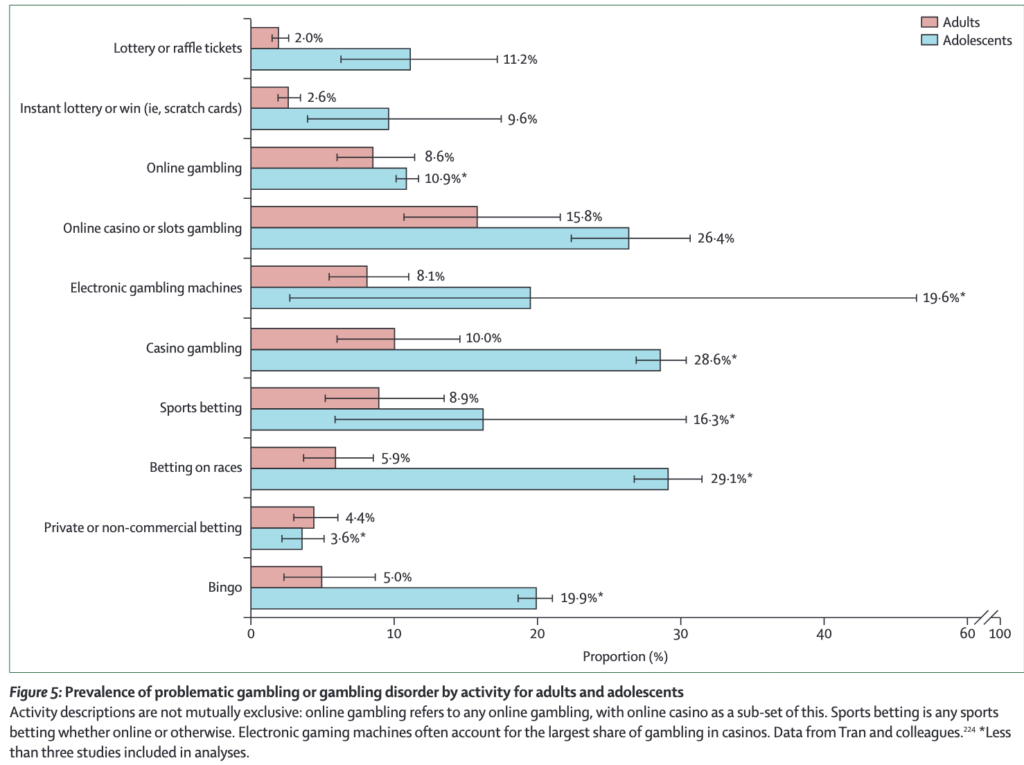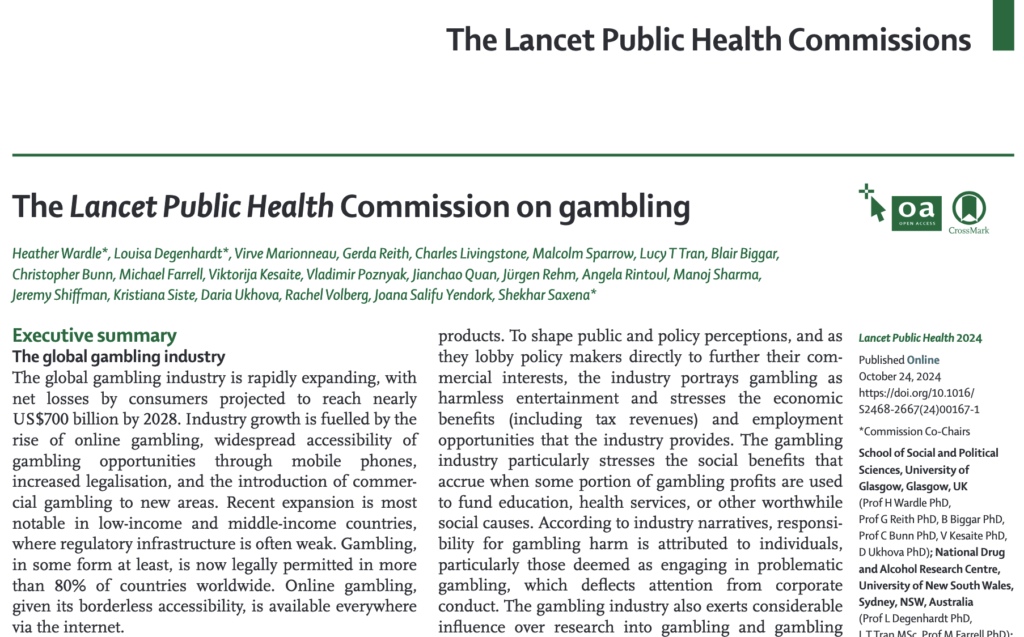Search Posts
Recent Posts
- Rhode Island Legislature Highlights Accomplishments for the 2025 Session June 25, 2025
- Sports in RI: Cody Tow, Volleyball Past, Present and Into His Future – John Cardullo June 25, 2025
- Need a Break? Time for Sour Grapes – Tim Jones June 25, 2025
- Rhode Island Weather Forecast for June 25, 2025 – Jack Donnelly June 25, 2025
- It is what it is: Commentary on 6.25.25 with Jen Brien June 25, 2025
Categories
Subscribe!
Thanks for subscribing! Please check your email for further instructions.

Gambling is not a simple leisure activity – it’s now an “international public health issue”
“No matter how you think you can outsmart the thing, they always win. Even if you think you’ve won some money, they’ve still won…” – Male sports bettor, aged 19 years
Gambling is not an ordinary kind of leisure; it can be a health-harming, addictive behavior. The harms associated with gambling are wide-ranging, affecting not only an individual’s health and well-being, but also their wealth and relationships, families and communities, and deepening health and societal inequalities.
Examining these harms is new research published by The Lancet’s journal on Public Health. Their Commission on Gambling unveiled the intersections between the social, commercial, legal, and political determinants of health. The Commission sheds light on the increasingly complex commercial ecosystem for gambling and its digital transformation which offer unparalleled capacities for gambling. The Commission calls on governments and policymakers to treat gambling as a public health issue—just as for other addictive and health-harming commodities, such as alcohol and tobacco—and provides recommendations to prevent and mitigate the broad range of harms associated with gambling.
Time for a public health response to gambling
Published in the Lancet Public Health Commission on Gambling—is an inquiry and response to a neglected, understudied, and expanding public health threat. By assessing the barriers to preventing gambling-related health harms, the Commission unveils and deciphers the intersections between the social, commercial, legal, and political determinants of health.
Rising problem among women and young people.
The Commission estimates that 46.2% of adults and 17.9% of adolescents had engaged in gambling in the past year, globally. While only a small proportion of individuals will be classified as engaging in problematic gambling (1.4%), considering the effect of gambling across the entire spectrum of consumption is crucial. An estimated 5.5% of women and 11.9% of men experience any risk gambling. The epidemiological landscape is changing, with a substantial number of women and young people taking part. For the gambling industry, this is not an epidemiological landscape, this is a rapidly expanding and highly profitable market.
Building on the Lancet series on the commercial determinants of health, and the work of others who have for decades described harmful industry practices, the Commission delves into the commercial determinants of gambling. The commercial gambling sector promotes its products and protects its interests by adopting corporate practices designed not only to influence consumer behavior, but also the narrative and political processes around regulation—with a tendency to focus on individual responsibility rather than broader policy changes. Such practices are not new and have been used by other harmful industries, but in today’s digitalized, interconnected, and borderless world they pose increasing threats to public health.
Blurred boundaries between digital gaming and gambling
The Commission describes a complex gambling ecosystem with unparalleled realms and capacities offered by digital transformation. Use of innovative digital marketing to target consumers through social media and user data, along with sports and media sponsorship are supporting gambling expansion. The boundaries between digital gaming and gambling are also becoming blurred. With the gambling industry leveraging digital transformation, the need to prevent and mitigate gambling-related harms is even more prescient.
For too long, governments—also conflicted because of the benefits they gain from taxes and revenues of a profitable industry—have paid little attention to understanding gambling-related harms. They have relied on oversimplified approaches, pointing to individual responsibility and the dangers for individuals at high-risk.
Balancing public health with competing economic interests is now crucial. The Commission calls on governments and policy makers to treat gambling as a public health issue—just as for other addictive and unhealthy commodities, such as alcohol and tobacco—and provides recommendations to prevent and mitigate the broad range of harms associated with gambling. Interventions at both population level and individual level are important.
The Commission calls for effective gambling regulation to be put in place in all countries, and to include reductions in population exposure, through prohibitions or restrictions on access, promotion, marketing, and sponsorship. The Commission also asks for the provision of affordable, universal support and treatment for gambling harms alongside campaigns to raise awareness of those harms.
The Commission recommends that regulatory protections include children and young people, enforcing minimum age requirements and mandatory identification; the provision of effective consumer protection measures, such as universal self-exclusion; the regulation of products proportionate to the risk of harms; and measures limiting gambling consumption, such as enforceable deposit and bet limits.
The industry will claim that their products are enjoyed by millions of people, the overwhelming majority of whom do not suffer adverse consequences, and that such recommendations are unfairly encroaching on the freedom of individuals. This Commission exposes these assertions as deeply misleading. Governments have a duty to protect their citizens from harmful and addictive products and to adopt a public health response to gambling.

Recommendations
Based on the risks associated with gambling and their probable trajectory, this Commission recommends urgent, coordinated action—by intergovernmental agencies, national, and local governments—to tackle the challenges outlined. Formulated specific recommendations are feasible, achievable, and likely to be effective in reducing gambling harms.
First, gambling is a public health issue. In setting policy, governments should give priority to protecting health and well-being over competing economic motivations.
Second, in all countries—whether or not gambling is legally permitted—effective gambling regulation is needed. Recommend the reduction of population exposure and availability of gambling, through prohibitions or restrictions on access, promotion, marketing, and sponsorship; the provision of affordable, universal support and treatment for gambling harms; and the de-normalization of gambling via well resourced social marketing and awareness campaigns.
Third, jurisdictions that permit gambling need a well resourced, independent, and adequately empowered regulator, focused on the protection of public health and well-being. At a minimum, regulatory protections must include the protection of young people from gambling by enforcing minimum age requirements, backed by mandatory identification; the provision of effective consumer protection measures, such as universal self-exclusion and user registration systems; the regulation of products proportionate to the risk of harms, based on harmful characteristics, such as intensity, immersivity, and continuous play; the enaction of mandatory measures limiting gambling consumption, such as enforceable deposit and bet limits, and universal precommitment systems.
Fourth, gambling-related policy, regulation, treatment, and research must be protected from the distortionary effects of commercial influence. Advocate for a rapid transition away from industry-funded research and treatment, coupled with and enabled by increased levels of investment from independent sources.
Fifth, at the international level, UN entities and intergovernmental organizations should incorporate a focus on gambling harms into their strategies and workplans for improving health and well-being.
Sixth, with regard to gambling harms, there is a need to develop an international alliance—including civil society, people with lived experience of harms related to gambling, researchers, and professional organizations—to provide thought leadership, advocacy, and convening of interested parties.
Seventh, the Commission recommends the instigation of the process to adopt a World Health Assembly resolution on the public health dimensions of gambling.
Acting on these recommendations offers governments a range of benefits. These recommendations assist governments in carrying out their constitutional and ethical duty to protect the health and well-being of their citizens. Enhancing protections brings the regulation of gambling more closely in line with controls on other addictive and harmful products.
Our recommendations provide most people who never gamble, or do so only very occasionally, with protection against corporate practices designed to coerce them into activities in which they would otherwise have little interest. By restricting advertising and marketing practices, governments can provide protections for those who need it most, such as children and young people.
Over the long term, these recommendations should reduce the burden of public costs associated with gambling by preventing and reducing harms. While governments readily appreciate revenues from the gambling industry and might even use gambling products for their own fund-raising purposes, they generally underestimate the prevalence and seriousness of social harm done and the associated public costs.
As the scale of commercial gambling increases and its reach extends across the globe, and as novel offerings proliferate, governments need to demonstrate that their legislative approach and regulatory structures are effective. When scandals occur in the industry or exploitative business practices are revealed, these are quickly branded as regulatory failures. Faith in government can be undermined by such scandals just as much as industry reputations are damaged. The public need to know that regulatory oversight of the gambling industry is appropriate and effective.
This Lancet Public Health Commission marks this as the beginning of a serious and sustained effort to apply public health logic as countries and communities respond to the rapidly increasing threat of gambling harms. They acknowledge that implementing these recommendations might take time, will not be easy, and will require sustained effort and co-operation from multiple international actors. They hope to establish a clear direction for future action that will lead to effective policy design and implementation.
Tracking and assessing progress on the recommendations of the Commission will require independent and robust global and national monitoring of the situation, using relevant indicators. The Commission report lays the foundations for the development of global monitoring systems, but substantial further work and research is required to develop a set of indicators and an accompanying accountability framework. Models from which to draw include the NCD Countdown 2030337 and the Countdown for Global Mental Health 2030 dashboard,338 which bring together reliable, valid, and feasible indicators to monitor global and national progress.
In the long term, success would mean more jurisdictions adopting policies known to be effective in preventing harms. As a community, there is a need to foster strong relationships with civil society and those with lived experience of harms and support the integration of their perspectives and contributions within the gambling policy cycle. Success would also mean having more civil society organizations adopt issues of gambling harms and include them within their portfolios.
The Commission urges governments at all levels to adopt their recommendations and to commit themselves to substantial improvements in the protection of public health and welfare from harms associated with gambling.
About the Lancet Public Health journal: The world-leading public health journal, the Lancet Public Health is committed to tackling the most pressing issues across all aspects of public health. In particular, and in line with the values and vision of The Lancet, [they say], “we have a strong commitment to using science to improve health equity and social justice. We take a broad and inclusive approach to public health, and we are interested in interdisciplinary research”. The Lancet began as an independent, international weekly general medical journal founded in 1823 by Thomas Wakley. Since its first issue (Oct 5, 1823), the journal has strived to make science widely available so that medicine can serve and transform society, and positively impact the lives of people.
To read the entire report:

https://rinewstoday.com/wp-content/uploads/2024/10/PIIS2468266724001671.pdf
Do you need help with gambling in Rhode Island?

We share Gamblers Anonymous – GA – info, here: https://www.gamblersanonymous.org/ga/content/20-questions
___
